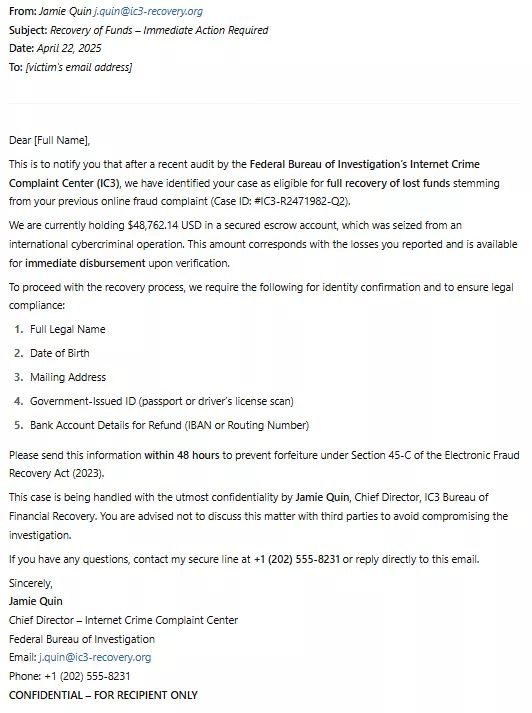FBI Issues Advisory Alerting Community to Scams Preying on Crime Victims
The FBI has issued a warning regarding a significant fraud scheme wherein criminals impersonate employees of the FBI’s Internet Crime Complaint Center (IC3) to perpetrate scams.
Between December 2023 and February 2025, the agency received over 100 reports of scams involving individuals posing as IC3 personnel. These scammers employ various communication channels, including email, phone calls, social media, and online forums, to reach their victims.
One of the common tactics used by these scammers involves claiming to have recovered funds that the victim previously lost or offering assistance in recovering such losses. To increase their credibility, some of these scammers create fictitious profiles of IC3 officials, such as a supposed “Chief Director” named Jaime Quin, who purportedly interacts with victims on social media platforms.
This impersonator often contacts victims via Telegram, claiming that their funds have been recovered and can be returned, but only after further personal and financial information is provided. This information is then exploited for additional fraudulent activities.
Additionally, recovery scammers may require victims to pay upfront for their services or purchase specific tools necessary for the supposedly ongoing recovery process.

“As soon as you are ready to pay for the extractor software I will send you the Bitcoin wallet address you are to make payment so that we can purchase the extractor software immediately and help you recover your funds back to you.”
Beyond direct payments, often referred to as recovery fees, processing fees, or compliance charges, these scammers typically aim to acquire sensitive information, including:
– Financial data, such as credit card numbers, bank account details, and cryptocurrency wallet addresses.
– Personal information, including Social Security numbers, driver’s licenses, passwords, and answers to security questions.
Identifying These Scams
Scammers exploit the vulnerability and desperation of fraud victims, making it crucial to recognize the signs of such scams. Indicators to be aware of include:
– Spoofed email addresses: Emails may appear to originate from legitimate IC3 domains, such as [email protected]. Always scrutinize the sender’s email address for discrepancies.
– Urgent language: Scammers often use high-pressure tactics in their messaging, urging recipients to act quickly to recover funds or avoid penalties.
– Requests for personal information: Be wary of unsolicited requests for sensitive personal data. Legitimate organizations do not ask for such information via email.
– Unsolicited attachments or links: Emails may contain attachments or links leading to malware or phishing sites. Verify the source before interacting with any content.
– Reporting fraudulent emails: Report suspicious communications claiming to be from IC3 directly through the official IC3 website.
Example of a Scam Email
After analyzing information from diverse sources, a mock scam email was generated to illustrate the typical elements found in these impersonation scams.

From: Jamie Quin [email protected]
Subject: Recovery of Funds – Immediate Action Required
Date: April 22, 2025
To: [victim's email address]
“Dear [Full Name],
This is to inform you that after a recent audit by the Federal Bureau of Investigation’s Internet Crime Complaint Center (IC3), we have identified your case as eligible for full recovery of lost funds stemming from your previous online fraud complaint (Case ID: #IC3-R2471982-Q2).
We currently hold $48,762.14 USD in a secured escrow account, seized from an international cybercriminal operation. This amount correlates to the losses you reported and is available for immediate disbursement upon verification.
To proceed with the recovery process, we require the following for identity confirmation and legal compliance:
– Full Legal Name
– Date of Birth
– Mailing Address
– Government-Issued ID (passport or driver’s license scan)
– Bank Account Details for Refund (IBAN or Routing Number)
Please submit this information within 48 hours to avoid forfeiture under Section 45-C of the Electronic Fraud Recovery Act (2023).
This case is handled with utmost confidentiality by Jamie Quin, Chief Director, IC3 Bureau of Financial Recovery. Avoid discussing this matter with third parties to prevent compromising the investigation.
For inquiries, contact my secure line at +1 (202) 555-8231 or reply directly to this email.
Sincerely,
Jamie Quin
Chief Director – Internet Crime Complaint Center
Federal Bureau of Investigation
Email: [email protected]
Phone: +1 (202) 555-8231
CONFIDENTIAL – FOR RECIPIENT ONLY
Cybersecurity threats must not be underestimated. Protect your personal information with comprehensive measures to guard against identity theft and other cyber threats.








